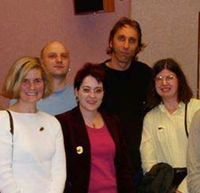and an expose of the West's confused morality? (thanks Andy)
Tsunami Showed What World Thinks of Africa
Charles Onyango-Obbo
Nairobi
As last week closed, the amounts of money pledged to deal with the Asian tsunami was nearly $4 billion - and Africa was bewildered and deeply worried.
As the world rushed to help Asia, where the deadly Christmas weekend tsunami wave killed 150,000 people and left millions homeless, there were fears that poor Africa would be forgotten.
If the tsunami had swept across Africa, it would have been nothing short of a miracle if at this point the pledges for help had reached even $250 million.
Yet, there was the strange spectacle of the French-based Medecins Sans Frontieres (Doctors Without Borders) appealing to donors to stop flooding it with money for tsunami relief.
The tsunami disaster is scary, but one wonders what a Rwandan genocide survivor thinks of it. Nearly one million people were killed in the 1994 Rwanda genocide, six times the number killed by the Asian tsunami.
The world paid a little attention, but took no action. Why the difference?
This cannot be explained by racism against black people. In fact, if it were racism, it would be good news, because then we could hope that the world would one day change its ways, or even be embarrassed into responding with equal care and generosity to Africa's tragedies.
Rather, this difference reminds us that Africa has been institutionalised in the global mindset as a failure. The result is that the international aid it receives (most of it official development assistance) has become inelastic; it's unlikely to increase no matter the scale of the crisis.
Thirdly, this aid is ritualised. How? Because Africa is presumed to be a failure, it's thought to have no creative energy.
A good African theatre troupe, therefore, will not find global success with a play about love, because it's something the world doubts we can comment sensitively or intelligently on.
The same troupe, however, will have money dropping out of its ears with a play about Aids - because it fits both the stereotype and reality of a diseased continent. In short, we have brought part of it on ourselves.
Irish rock star Bob Geldof, the man who put together the Live Aid concert to raise funds for famine victims in Africa in the 1980s, has appealed to the world not to forget Africa in the rush to help Asia. At the time of the first Live Aid concert, famine was felling thousands of Ethiopians as if they were flies.
Now we have a second Live Aid, to deal with the same problems in Africa. Some of the less sentimental observers have remarked that 24 years later, the poverty and hunger is no better. In fact, if you factor in the progress that the continent should have made over this period and didn't, it is much worse off.
Asia, on the other hand, has come to be associated with progress and improvement over the past 25 years. The bulk of the emerging markets, new "economic tigers," the best examples about fighting poverty, are Asian. In the mind of the average person in the West, the 10 dollars they send to aid tsunami victims will change things for the better.
The intended recipients will receive it. The authorities will rebuild hospitals and roads with it. And entrepreneurs will exploit the inflow of resources to recreate thriving businesses. In Africa? It will go to waste, or be stolen by politicians and every other official who lays their hands on it.
It's something we should be able to understand. If you found a colony of 20 starving beggars on the corner of a Kampala or Nairobi street, and then read in the day's paper the story of the best student in primary school exams, who is looking for money to go on to secondary school because his parents are too poor to afford it, whom are you likely to help?
Most Africans would help the student and let the beggars die, because at least the student is going somewhere.
Charles Onyango-Obbo is managing editor in charge of media convergence at the Nation Media Group.


















